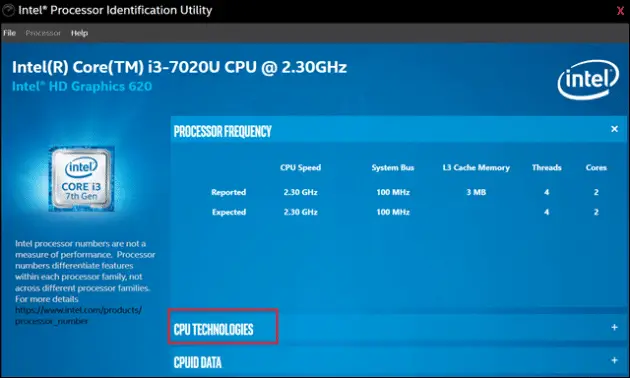
Intel® Streaming SIMD Extensions (Intel® SSE,Intel® SSE2,Intel® SSE3, and Intel® SSE4).Single Instruction Multiple Data (SIMD).For instructions on how to disable these power management features, please contact your system manufacturer.Intel® Instruction Set Extensions are additional instructions that can increase performance when the same operations are performed on multiple data objects.ĭetailed instructions are listed in Intel® Architecture Instruction Set Extensions Programming Reference.

We recommend you disable any power management features such as Intel SpeedStep technology and configure your system to its optimal power management settings when running the Intel processor diagnostic tool. It means that the enabled power management feature optimizes the efficiency of the processor, either to save power or to reduce heat within the system. This does not mean that the processor is operating at degraded performance levels. These types of power management features may result in meager tested frequency results. Some power management features (i.e., Intel SpeedStep technology) throttle or reduce the system's operating frequency. Over-Clocking should be disabled while running Intel processor diagnostic tool. IPDT is only compatible with motherboards built using Intel 32-bit architecture. Consult your motherboard manufacturer's support to ensure the BIOS revision is at the correct revision. The motherboards BIOS must be at the minimum BIOS revision specified to support your Intel processor. If you are using an Intel® motherboard, please use this utility: Intel Processors and Boards Compatibility Tool. Consult your motherboard manufacturer's support to ensure the motherboard supports your processor.

The motherboard you use to test your processor must be fully compatible with your Intel processor. Intel processor diagnostic tool does not support multiple processors inserted into a multiprocessor system configuration. Only one Intel processor must be tested at a time in this system configuration. The Intel processor diagnostic tool is compatible with multiprocessor systems. Intel processor diagnostic tool test system requirements Additionally, it can be configured to enable (run) or disable (skip) individual default configurations used for this mode of operation. The diagnostic can be configured to execute in one of two modes, presence test mode or verification mode. The diagnostic tool checks for brand identification, verifies the processor operating frequency, tests specific processor features and performs a stress test on the processor.


The Intel Processor Diagnostic Tool is provided to verify the functionality of an Intel microprocessor.


 0 kommentar(er)
0 kommentar(er)
